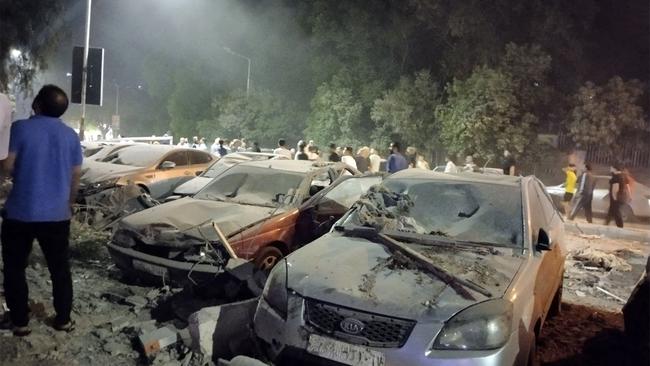As Israel plots to strike Iran, its choices range from symbolic to severe
Israel has promised to retaliate for Iran’s massive missile attack last week. How it does so involves great risk, and could have major repercussions for the Middle East and the world.

Israel has promised to retaliate for Iran’s massive missile attack last week. How it does so involves great risk, and could have major repercussions for the Middle East and the world.
Israel’s options range from symbolic strikes on military targets to attacks on Iran’s vital oil industry or its secretive and heavily fortified nuclear program.
The intensity and timing of any retaliatory strike was expected to top the agenda of a planned meeting this week at the Pentagon between Israel’s defence minister and his US counterpart. But on Tuesday the meeting was abruptly postponed.
In a sign of possible disagreement over the right approach, President Joe Biden has already urged Israel not to hit Iran’s nuclear program and discouraged it from hitting the oil industry.
There is broad consensus that Israel must strike back, but deep disagreement over the best way to do so. “The question is not whether Israel will retaliate or respond,” former prime minister Ehud Olmert said. “The question is which way.”
Mr Olmert, who served as prime minister from 2006 to 2009, said Israel was more than capable of coping with challenges.
“We have the capabilities,” he said. “I’m not certain it would be wise and responsible to expose them.”
Even if Israel has the means, there are diplomatic considerations. A strike on the oil sector, Iran’s economic backbone, or on the nuclear program would almost certainly guarantee an Iranian response and raise the risk of further escalation.
Such strikes could rattle global oil markets and shake the US economy on the eve of a presidential election. They also could risk Iranian retaliation not only against Israel, but against American troops stationed in the region or Gulf Arab countries aligned with the West.
“Unlike Lebanon and Gaza, every Israeli attack on Iran has international and global repercussions,” said Menahem Merhavy, an Iran expert at Hebrew University in Jerusalem.
Former leaders are divided on what path Israel should choose.
Mr Olmert said a strike on multiple military targets, spread across Iran’s vast territory, would be more than enough to send a message. The goal, he said, is to show that Israel can strike anywhere and anytime.
“That’s precisely what deterrence is all about,” he said.
Mr Olmert said hitting Iran’s oil sector would be an unnecessary escalation that invites a response, and that striking the nuclear program was not worth the risk. Not only would it trigger Iranian retaliation, but the odds of success were uncertain, he said.
“Trying to attack the nuclear program will be a mistake,” he said.
Another former prime minister, Yair Lapid, believes Israel should strike Iran’s oil industry infrastructure. “That is the most painful target for the Iranian regime,” Mr Lapid, who served as premier in 2022, told AP.
“Iran’s ballistic missile attack against Israel must be met with a forceful response,” he said, adding that Iran must understand “there is a high cost to its regional aggression”.
In an interview with the Israeli news site Ynet, Mr Lapid said a strike on Iran’s nuclear facilities should only be done as part of an international coalition in co-ordination with the US.
Mr Lapid’s predecessor as prime minister and former governing partner, Naftali Bennett, takes an even tougher line, saying now is the time for Israel to bomb the Iranian nuclear project.
Mr Bennett said in a video posted on social media on Tuesday that Iran and its allies had been weakened, and that Israel had a rare chance to deliver a decisive blow to Iran’s leadership, economy and nuclear program.
“We must not settle for Iranian military bases or noisy-yet-meaningless actions that are meant only to deliver a message,” Mr Bennett said. “The time for messages is over.”
Mr Olmert, however, said he hoped cooler heads would prevail.
“What do we want to achieve and how far do we want to go and how arrogant do we want to be?” he said. His advice: “Try to be smart.”
AP


